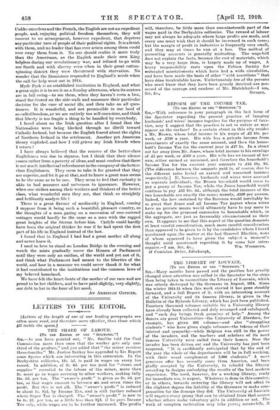LETTERS TO THE EDITOR.
[Letters of the length of one of our leading paragraphs are often more read, and therefore more effective, than those which fat treble the space.] -- THE SHARE OF LABOUR.
(To sae EDITOR or THE " SPECTATOR."I Ste,—As you have pointer] out, "Mr. Smillie told the Coal Commission more than once that the worker gets only one- third of the produce," and you added that " the miner receives three-fourths." Mr. Justice Sankey has appended to his Report some figures which are interesting in this connexion. In tho Derbyshire collieries, Us. 3d. is paid in wages on every ton raised. In addition, of Is. 6d. per ton paid for "stores and supplies" essential to the labour of the miner, more than 2s. must go in -wages aceruiw to other workers, making fully 15s. 5d. per ton. The "owner's profit" is given as Is. 5d. per ion, so that wages amount to between ax and seven times the profit. But this is not all. The "owner's profit" is reduced to about Is. 91.1. by Income Tax, and is still further reduced where Super Tax is charged. Tho "owner's profit " is now to be Is. 2d. per ton, or a little less than 91d. if he pays Income Tax only, while wages are to be further increased. The profits will, therefore, be little more than one-nineteenth part of the wages paid in the Derbyshire collieries. The reward of labour may not always be adequate where large profits are made, and every one must wish that it should be increased in such eases; but the margin of profit in industries is frequently very small, and they may at times be run at a loss. The method of presenting accounts is generally misleading. The wage-bill does not explain the facts, because the cost of materials, -which may be a very largo item, is largely made tap of wages, A. heavy responsibility rests upon the Fabian Society for reiterated misstatements which have had a 'wide circulation, and have been made the basis of other "wild assertions" that have (Ides incalculable harm. Unfortunately few of the persons who must know that they have been grossly deceived era pos- sessed of the courage and candour of Mr. Blatchford.—I any



































 Previous page
Previous page